Posted by Elena del Valle on July 27, 2012

Sam, Elida and Dulce Mejia-Perez outside of Quetzaltenango, Guatemala
Videlo, photos: POV, Theo Rigby, Katina Papson
In 2010, with a $10,000 budget and support from his graduate program, filmmaker Theo Rigby, with the help of three assistants, showcased the case of a family of five divided by the parents deportation from the United States many years after they entered the country illegally. Sin País (Without Country in Spanish), a 19-minute documentary style short film, follows the Mejia Family through the deportation process of the parents who leave the country with Dulce, their young daughter, while their two teenage children remained in the United States. Scroll down to watch a video clip in Spanish with English subtitles.
The film, a Student Academy Award winner, features tearful scenes in the family’s home in the United States, rural takes with the parents and their youngest child on their return to Guatemala, interviews with the two teenagers, and a Christmas visit from the teenage daughter from the United States to Guatemala; the teenage boy could not travel because his immigration status was uncertain.

Filmmaker Theo Rigby
“I made Sin País to show some of the nuances and complexities of deportations, and to address how mixed-status families often grow deep roots in the U.S. over many years,” said Rigby. “The film shows how deportations have vast ripple effects that often effect many U.S. Citizens, and as ICE deported a record number of people in 2011 (400,000), the story of Sin País resonates very deeply on myriad social and political levels today.”
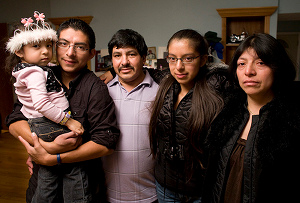
The Mejia-Perez family in California on the night of the deportation of Sam and Elida
The film was selected by Point of View (POV), a long running showcase that features the work of some of today’s independent documentary filmmakers, and will air on on television nationwide in POV Short Cuts Thursday, August 9, 2012 at 10 p.m. on PBS. The one-hour program, part of the 25 anniversary season of POV, will also include The Barber of Birmingham: Foot Soldier of the Civil Rights Movement and three new animated shorts: Eyes on the Stars, Facundo the Great and A Family Man.

Cynthia Lopez, co-executive producer, POV
“About 1,200 documentaries are submitted a year and we select anywhere between 12-18 premieres. In terms of shorts, about 100 shorts are submitted to POV per season and we select approximately 6-8 per year. Highly competitive,” said Cynthia Lopez, co-executive producer at POV by email when asked about the selection process.
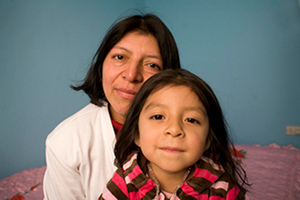
Elida and Dulce Mejia-Perez
Rigby’s work has focused on topics ranging from the war in Iraq to the justice system. For the past six years he has been making films about immigration issues in the United States. POV has brought 325 acclaimed documentaries to millions of viewers nationwide. POV Short Cuts will stream on the POV website from August 10 to September 9, 2012.
Posted by Elena del Valle on July 25, 2012

Fewer young people are obtaining a driver’s license, according to researchers at University of Michigan Transportation Research Institute
Photo: HispanicMPR.com
Research conducted by Michael Sivak and Brandon Schoettle of the University of Michigan Transportation Research Institute, Ann Arbor, Michigan indicates again that fewer young people, compared to previous decades, are obtaining a driver’s license. The researchers reviewed driver license and general population information from the Federal Highway Administration and the United States Census Bureau to find that the trend they had identified in the past continues. As an example, they point to drivers 19 years of age. Their findings indicate 87.3, 75.5, and 69.5 percent of these individuals had a driver’s license in 1983, 2008, and 2010 respectively.
“The most significant aspect of our findings is that the trend that we observed in a previous study is continuing,” said Sivak by email. “Specifically, young and middle-aged persons are less likely to get a driver’s license now than were the corresponding age groups 30 years ago. We think that the availability of electronic communication has a lot to do with this trend.”
Earlier this year (see Older adults more likely drivers than in past decades), after examining data for 1983 to 2008 in the United States and 14 other countries they concluded there was a noticeable decrease in the percent of young people obtaining a driver’s license and an increase in the percent of older people with one. They have since examined additional data in the United States through 2010 that indicates the trend continues for young people and that there is a reduction in the proportionate number of driver’s licenses across age groups.
They still believe the trend relates inversely to the continued increase in internet usage. They concluded that the more people rely on the internet for contact the less they require in person contact.
It’s unclear whether the trend applies to all market segments. Hispanics which as a market are younger than the general market may be affected. A Ford Motor Company representative when asked about the trend responded negatively.
“For Hispanic consumers cars are a symbol of freedom, accomplishment and status,” said Alvaro Cabal, manager, Multicultural Communication, Ford Motor Company.
Except in cities with efficient mass transportation systems like New York and Washington, D.C., the research findings are not in evidence in car buying behavior, he explained by phone. He went on to say that since the 2008 recession when car sales dropped the company has experienced a steady increase in car purchases, especially among 18 to 45 year old buyers.
Posted by Elena del Valle on July 23, 2012
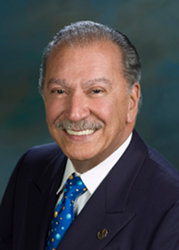
Eduardo Caballero, co-owner, Caballero Spanish Media
Photo: BigVoice Communications
Entrepreneurs Eduardo Caballero and Peter Spengler of Coral Gables, Florida are owners of Caballero Spanish Media (CSM) founded in 1973. They plan, subject to regulatory and other approvals, to buy nine television stations in Texas and Central California targeting local Mexican-Americans, growing from two staff to eight or more depending on market conditions at the time of the purchase.
Following CSM’s acquisition, the local stations are expected to broadcast a new portfolio of original Spanish language content produced in Northern Mexico and the United States for the domestic Spanish dominant Mexican consumer, offering popular and traditional music formats and health programming.
“With the broadcast media landscape undergoing drastic changes and audiences becoming more fragmented, this is a great time to offer a rich variety of music and entertainment to a growing Hispanic market and better meet the needs and wants of our audience” said Eduardo Caballero, president, CSM.
“We believe that the concentration, and homogeneity of these areas (being made up almost entirely of Mexican-Americans) gives us the unique opportunity to serve this market separately from the rest of the Hispanic population of this country.”
The Texas stations are KGBS-CA in Austin and KGMM-CA in San Antonio. The California stations are KMMC-LD in San Francisco, KMMA-CD in San Luis Obispo, KZMM-CD in Fresno, KMUM-CA in Sacramento, KMMD-CD in Salinas/Monterey, KMMW-LD in Stockton, KQMM-CD in Santa Maria, and KVMM-CD in Santa Barbara to be operated by CSM under a Local Marketing Agreement.
Currently the stations reach an estimated 1.1 million Hispanic households in Central California and 600,000 in San Antonio and Austin. The buyers goal is to grow the audiences significantly in both markets.
Comments:
Filed Under: Media
Posted by Elena del Valle on July 20, 2012

Sirenas promo image
Photos: Discovery en Español
Earlier this year, Animal Planet aired Mermaids: The Body Found, a two-hour science fiction special narrated by Greg Stebner based on “real events and scientific theory” filmed in Cape Town, South Africa; London, England and Bristol, United Kingdom. The computer graphics were done in Winchester, United Kingdom.
Mermaids explores the so called Aquatic Ape Theory which brings forward the possibility of human like evolution underwater. The filmmakers wonder whether it is possible that while mankind evolved into terrestrial humans some, aquatic relatives they believe, could have evolved into beings similar to the mythical mermaid. Discovery en Español will air Sirenas, a Spanish language version of the program, Sunday, July 22 at 9 p.m. ET/PT and 7 p.m. ET/PT July 28.

Image from Sirenas – click to enlarge
The program points to differences between man and other primates and the many features they believe humans share with marine mammals such as webbing between fingers (other primates don’t have this, according to promotional materials), subcutaneous fat (providing insulation from cold water), control over breath (humans can hold their breath up to 20 minutes, longer than any other terrestrial animal, the program producers point out), limited body hair (lack of hair avoids drag in the water), instinctive ability to swim from birth, and a highly developed brain dependent on nutrients provided by seafood, according to the program’s promotional materials.

Image from Sirenas – click to enlarge
The producers focused on two facts in the special. First, a series of covert sonar tests conducted in the early 1990s by the United States Navy and linked to mass die-offs of whales, which washed up on various beaches throughout the world. They also gave weight to a mysterious sound deep in the Pacific thought to be organic detected (though never identified) in 1997 by scientists at the National Oceanic Atmospheric Administration (NOAA).
Mermaids was produced for Animal Planet, part of Discovery Communications, by Darlow Smithson with Tom Brisley as executive producer for Darlow Smithson; Charlie Foley as executive producer, creator and writer; Vaibhav Bhatt, co-writer and supervising producer, and Jamie Dugger, producer, for Animal Planet. Steve Gomez of Bandito Films was director of animation. Discovery en Espanol is the Spanish-language voice of Discovery.
Posted by Elena del Valle on July 18, 2012
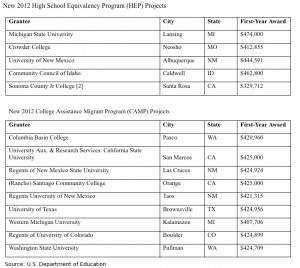
Click to enlarge
Photo, chart: U.S. Secretary of Education
Targeting migrant students and their families? You may be interested to know that the U.S. Department of Education awarded $5.9 million to 14 grantees in nine states for education for high school and college students migrant or seasonal farm workers, or the children of such workers. The five-year grants are awarded under the High School Equivalency Program (HEP) and the College Assistance Migrant Program (CAMP) through the Department’s Office of Migrant Education said to serve 5,000 HEP and 2,000 CAMP students annually.
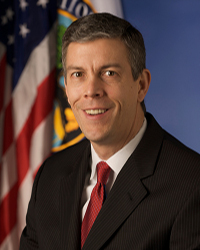
Arne Duncan, U.S. Secretary of Education
“The students helped by HEP and CAMP are some of the most motivated learners in America,” said Arne Duncan, United States Secretary of Education. “These grants will help hardworking farmworkers and their families obtain the quality education that they need to compete in the 21st century global economy.”
The purpose of the HEP grants is to help migrant and seasonal farmworkers, and members of their immediate families obtain general education diplomas that meet the guidelines for high school equivalency established by the state in which the HEP project is conducted. The program helps migrant youth gain employment or placement in an institution of higher education or other postsecondary education or training via counseling, job placement, health care and housing for residential students.
CAMP grants support students who are migratory or seasonal farm workers, or the children of such workers, during their first year of undergraduate studies and to continue in postsecondary education. The mission of the Office of Migrant Education (OME) is to “provide excellent leadership, technical assistance, and financial support to improve the educational opportunities and academic success of migrant children, youth, agricultural workers, fishers, and their families.”
Posted by Elena del Valle on July 16, 2012
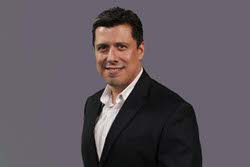
Albert J. Estrada, VP, business development, Olympusat

Oscar Madrid, director, Multicultural Marketing, Verizon
Photos: Olympusat, Verizon
A podcast interview with Albert J. Estrada, vice president, business development, Olympusat,Inc., and Oscar Madrid, director, Multicultural Marketing, Verizon, is available in the Podcast Section of Hispanic Marketing & Public Relations, HispanicMPR.com. During the podcast, they discuss marketing to Hispanics with Elena del Valle, host of the HispanicMPR.com podcast.
In the early 1990s, Albert started his career in the entertainment industry as account executive with Home Box Office (HBO) where we managed the west Texas region for HBO’s cable television affiliate sales group. Later he became part of the initial team that launched DirectTV. While there he led and crafted the marketing strategy for DirectTV’s introduction into fifteen countries within the Latin America region. After that he marketed and sold high-power geostationary satellites at Space Systems Loral.
Oscar, a native of El Paso, Texas, oversees the national marketing strategy for Hispanic, Asian and African American consumer segments for Verizon FiOS and other consumer products and services. He is a 23 year veteran of the telecom industry, beginning his career with Bell Atlantic, a Verizon legacy company, in 1989. Oscar has served as a board member for the Orange County Hispanic Chamber of Commerce Education Foundation, has partnered with the Hispanic Scholarship Fund on fundraising initiatives and supports Aspira New York’s fundraising and marketing efforts. He is a recipient of the New York Chapter of Aspira’s Latino Leaders Award.
To listen to the interview, scroll down until you see “Podcast” on the right hand side, then select “HMPR Albert Estrada, Oscar Madrid ” click on the play button below or download the MP3 file to your iPod or MP3 player to listen on the go, in your car or at home. To download it, click on the arrow of the recording you wish to copy and save it to disk. The podcast will remain listed in the July 2012 section of the podcast archive.
Posted by Elena del Valle on July 13, 2012
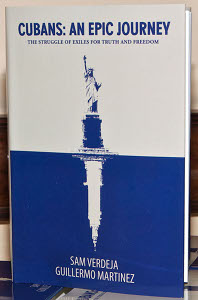
Cubans book cover
Photos: Facts About Cuban Exiles
Six women and twenty-five men contributed forty essays to Cubans: An Epic Journey (Reedy Press, $27.92), a 782-page softcover book with a 16-page photo section about their impressions of the South Florida Cuban exile experience from the 1950s until today published with the support of Facts About Cuban Exiles (FACE) with the sponsorship of John S. and James L. Knight, The Armando Codina Family, First Bank of Miami, Carlos Migoya, and Riteway Properties.
In the Introduction, the authors say that Cubans in the United States represent 3.5 percent of the Hispanic American population or approximately 1.8 million people. They explain that the largest concentration of Cubans (55 percent) lives in Greater Miami, Florida and describe the Miami community as having established a “parallel mainstream” where they “can sustain a refined culture – creating and preserving its own music, food, literature, theater, cinema, radio and television.”
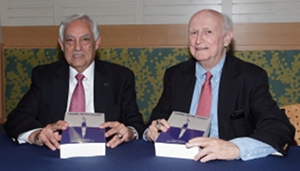
Sam Verdeja and Guillermo Martinez, editors, Cubans
The work was edited by Sam Verdeja, a magazine publisher, and Guillermo Martinez, a print and broadcast journalist. In addition to Verdeja and Martinez, Cesar Pizarro, a newspaper executive, Howard Kleinberg a newspaper editor, Louise O’ Brien, a business executive, Leonardo Rodriguez, a university professor and Francisco Rodriguez, a broadcast commentator participated in the project. Other contributors include Jose Cancela, Eloy Cepero, Raul Chao, Juan Clark, Olga Connor, Carlos Curbelo, Rogelio de la Torre, Sonia Frias, Jose Garrigo, Armando Gonzalez, Jose Irastorza, Federico Justiniani, Aida Levitan, Roly Martin, Rene Murai, Olga Nodarse, Marcos Antonio Ramos, Alejandro Rios, Raul Rodriguez, Rene Rodriguez, Silvia Unzueta, Enrique Viciana, Alberto Vilar, and Eduardo Zayas-Bazan.
The book is divided into 39 chapters in two major sections, The History in the first 16 chapters and The Exile Experience in the remaining chapters, as well as an Epilogue and five appendices. The second section of the book is subdivided into Business and Finance; Arts, Entertainment, and Religion; Media and Advertising; Professionals; and Political, Civic and Social Life.

Click to buy Cubans
Comments:
Filed Under: Books
Posted by Elena del Valle on July 11, 2012

A scene from Bartali
Photos: Vme
In 2006, Rai Fiction and Endemol produced Bartali in Italy about Gino Bartali, an Italian cyclist who won the Tour de France twice. Directed by Alberto Negrin starring Pierfrancesco Favino, Simone Gandolfo, Nicole Grimaudo and Carlo Giuffre with a musical score by Ennio Morricone, described in promotional materials as one of the most influential film music composers of the 20 century, Bartali will air as a four-part miniseries on Vme beginning at 9 p.m. ET/PT July 16.
Dubbed into Spanish it may be the first time the series is airing in the United States. The program is scheduled to air for four nights and each episode is two hours long. Favino plays Gino Bartali while Grimaudo plays Adriana Bartali, Gandolfo plays Fausto Coppi and Giuffre plays Cardinale Dalla Costa.

A scene from Bartali
As a youngster Bartali nearly abandoned cycling following the death of his brother Giulio in a race. He continued cycling with the help of his brother Leone and his faith. In 1938, he won the Tour de France in honor of his brother’s memory.

A scene from Bartali
A devout Catholic, Bartali’s religious and moral beliefs led him to use his cycling talents to assist his friend Cardinal Dalla Costa and the Italian resistance during the war. In 1948, Italian Prime Minister De Gaspari asked Bartali to help ease political tensions by winning the Tour de France again and he did. Many historians believe, according to promotional materials, that the national enthusiasm that resulted from his second victory helped prevent a civil war.
Vme, a 24-hour Spanish language network partnered with public television stations, offers drama, music, sports, news, current affairs, food, lifestyle, nature and educational preschool programs. The network estimates it reaches more than 10 million Hispanic homes. Vme is the first venture of the media production and distribution company, Vme Media, Inc.
Posted by Elena del Valle on July 9, 2012
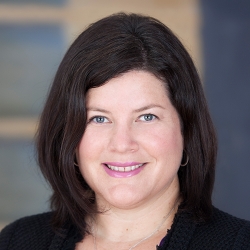
Amanda Fernandez, vice president, Latino Community Partnerships, Teach For America
Photo: Teach For America
A podcast interview with Amanda Fernandez, vice president, Latino Community Partnerships, Teach For America is available in the Podcast Section of Hispanic Marketing & Public Relations, HispanicMPR.com. During the podcast, she discusses educational inequity with Elena del Valle, host of the HispanicMPR.com podcast.
Amanda leads Teach For America’s Latino Initiatives that support outreach to the Latino community and recruitment, advancement and development of Latino corps members and staff. She brings over 20 years of experience in recruiting, diversity, organization development, change management and Latino community relations. Amanda manages national partnerships and outreach activities with Latino serving organizations and institutions. In addition, she guides and leads efforts focused on Latino staff initiatives and across program teams within Teach For America.
Prior to joining Teach For America, Amanda was a director at The Bridgespan Group where she served as an organizational consultant to youth and education clients in support of their strategic planning efforts.
To listen to the interview, scroll down until you see “Podcast” on the right hand side, then select “HMPR Amanda Fernandez” click on the play button below or download the MP3 file to your iPod or MP3 player to listen on the go, in your car or at home. To download it, click on the arrow of the recording you wish to copy and save it to disk. The podcast will remain listed in the July 2012 section of the podcast archive.






























